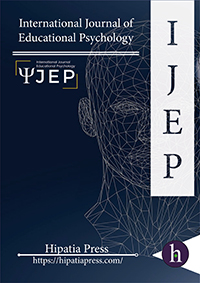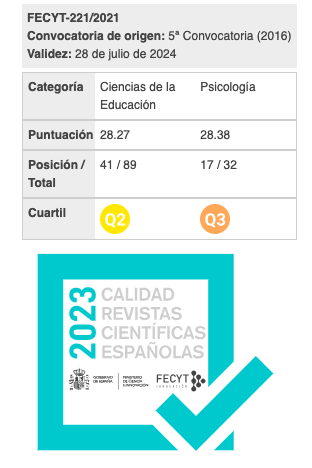Academic Career Development Stress and Mental Health of Higher Secondary Students- an Indian Perspective
Keywords:
Downloads
Abstract
The authors explored the mental health of students with their academic career-related stressors collecting data from 400 students of different schools of Eastern part of India by using; namely GIS, theGeneral Health Questionnaire (GHQ) and theAcademic Career Development Stress Scale. The data was subjected to t tests and ANOVA. Results indicated (i) academic career development stress along with its ten components reveal dissimilarities with respect to gender and streams of study, (ii) significant relationship were indicated between the mental health status of students and various aspects of academic stress and demographic factors, (iii) qualitative analyses highlighted the complex of association among academic stress, mental health and other variables.
Downloads
References
Abouserie, R. (1994). Sources and levels of stress in relation to locus of control and self-esteem in university students, Educational Psychology, 14(3), 323–330.
Google Scholar CrossrefAkgun, S., Ciarrochi, J., & Mersin, U. (2003). Learned resourcefulness moderates the relationship between academic stress and academic performance. Educational Psychology, 23(3), 287-294.
Google Scholar CrossrefAllen, S., & Heibert, B. (1991). Stress and coping in adolescents. Canadian Journal of Counselling, 25(1), 19-32.
Google Scholar CrossrefAwake, (1998). “Do you suffer from Burnout?” Awake, New York: Watch Tower Bible and Track Society.
Google Scholar CrossrefBasu, S., & Dasgupta, S. K. (1996). Bengali version of general health questionnaire-28, Department of Applied Psychology, University of Calcutta.
Google Scholar CrossrefBritton & Tesser, (1991). Effects of time-management practices on college grades. Journal of Educational Psychology, 83(3), 405-410.
Google Scholar CrossrefCampbell, R. L., & Svenson, L.W. (1992). Perceived level of stress among university undergraduate students in Edmonton, Perceptual and Motor Skills, 75(2), 552-554.
Google Scholar CrossrefChng, C. L., Ding, J., & Miguel A. P. (1998). Validation of the east Asian student stress inventory (EASSI). American Journal of Health Studies. 14(3).
Google Scholar CrossrefGoswami, N. (2000). A study on level of self-confidence, success-anxiety and attitude of the fresh and repeater candidates preparing for competition - Joint Entrance Examination. Unpublished Dissertation in Applied Psychology, Calcutta University, 1-9.
Google Scholar CrossrefGoldberg D. P., & Hillier V. F. (1979). A Scaled version of the General Health Questionnaire. Psychol Med, 9, 139-145.
Google Scholar CrossrefGoodman, L. A., Koss, M. P., & Russo, N. F. (1993). Violence against women: Physical and mental health effects. Part I. Research findings. Applied and Preventive Psychology, 2, 79-89.
Google Scholar CrossrefHembree, R. (1988). Correlates, causes, effects, and treatment of test anxiety. Review of Educational Research, 58, 47-77.
Google Scholar CrossrefHudd, S., Dumlao, J., Erdmann, S., & Murray, D. (2000). Stress at college, effects on health habits, health status and self-esteem. College Student Journal, 34(2), 217-227.
Google Scholar CrossrefKwan, C. M. L., Love, G. D., Ryff, C. D., & Essex, M. J., (2003). The role of self-enhancing evaluations in a successful life transition. Psychological Aging, 18, 3–12.
Google Scholar CrossrefLay, C. H., & Schouwenburg, H. C. (1993). Trait procrastination, time management, and academic behaviour. Journal of Social Behaviour and Personality, 84(4), 647-662.
Google Scholar CrossrefMacan, et al (1990) College students’ time management: correlations with academic performance and stress. Journal of Educational Psychology, 82 (4), 760-768.
Google Scholar CrossrefMcCormick, A. S. (1996). Drinking in stressful situations: College men under pressure. College Student Journal, 30(1), 65-77.
Google Scholar CrossrefMishra, R., & McKean, M. (2000). College students’ academic stress and its relation to their anxiety, time management, and leisure satisfaction. American Journal of Health Studies, 16, 41-51.
Google Scholar CrossrefMishra, R., Crist, M., & Burant, C. J. (2003). Relationships among life stress, social support, academic stressors and reactions to stressors of international students in the United States. International Journal of Stress Management, 10(2), 137-157.
Google Scholar CrossrefMurphy, M. C., & Archer, J. (1996). Stressors on the college campus: A comparison of 1985-1993. Journal of College Student Development, 37(1), 20-28.
Google Scholar CrossrefNaquin, M. R., & Gilbert, G. G. (1996). College students’ smoking behaviour, perceived stress, and coping styles. Journal of Drug Education, 26, 367-376.
Google Scholar CrossrefPekrun, R. (1992). The impact of emotions on learning and achievement: Towards a theory of cognitive/motivational mediators. Applied Psychology: An International Review, 41, 359-376.
Google Scholar CrossrefPramanik, K., & Ray, A. (2003). Career stress indicators, perceived. Job opportunities and coping styles of university students. Industrial Psychiatry Journal, 12(1), 49-52.
Google Scholar CrossrefRagheb, K. G., & McKinney, J. (1993). Campus recreation and perceived academic stress. Journal of College Student Development, 34(1), 5-10.
Google Scholar CrossrefRay, A., & Goswami, N. (2000). Self-confidence and success-anxiety of fresher and repeaters preparing for joint entrance examination. Journal of Applied Psychological Issue, 4(2), 6(2), 21-24.
Google Scholar CrossrefSeipp, B. (1991). Anxiety and academic performance: a meta-analysis of findings. Anxiety Research, 4, 27-41.
Google Scholar CrossrefSharma, E., & Jaswal, S. (1999). Personality as determinant of academic stress among adolescents. Indian Journal of Psychological Issues, 7(2), 16-23.
Google Scholar CrossrefSharma, H. L., & Sharma, S. (2009). Conventional teaching vs learning in small groups. Indian Educational Review, 45 (2), 92-105.
Google Scholar CrossrefSpielberger, C. D., & Vagg, P. R. (1995). Test Anxiety: A Transactional Process Model in C.D. Spielberger and P. R. Vagg (Eds.), Test Anxiety: Theory, Assessment and Treatment,. Washington D. C.: Tylor and Francis, 3-13.
Google Scholar CrossrefVerma, S., Duggal, S., & Supriya, (1995). Effective coping strategies in college students. Journal of Psychological Researches, 39 (1-2), 7-13.
Google Scholar CrossrefWorld Health Organization, (2005). Promoting Mental Health: Concepts, Emerging evidence, Practice: A report of the World Health Organization, Department of Mental Health and Substance Abuse in collaboration with the Victorian Health Promotion Foundation and the University of Melbourne. World Health Organization. Geneva.
Google Scholar CrossrefDownloads
Published
Almetric
Dimensions
How to Cite
Issue
Section
License
All articles are published under Creative Commons copyright (CC BY). Authors hold the copyright and retain publishing rights without restrictions, but authors allow anyone to download, reuse, reprint, modify, distribute, and/or copy articles as the original source is cited.
















